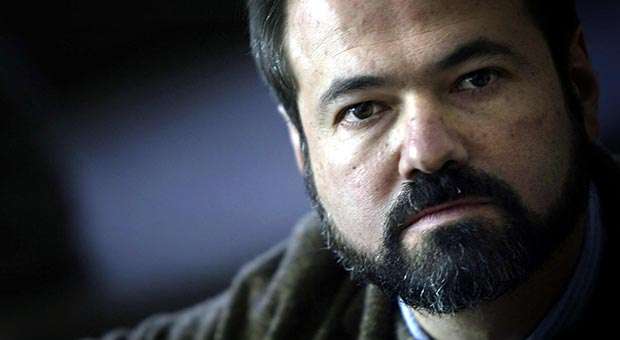In the picture of Juan Villoro in the cover of his works published by the Anagrama Publishing House, he appears in front of a desk with an open book or notebook. The head of the black-bearded and wide forehead Mexican writer is slightly turned to the left, with his attention centered to someone or something outside the image, though he is likely to be just thinking rather than looking at something in particular. But, thinking about what? I would like to believe he is thinking on what he was reading in that moment. I may be wrong and Villoro might actually be thinking about something pedestrian like tomorrow´s errands (in case he did errands) or in that dinner he was invited to and he is not willing go. However, the image seems forged due to its perfection and eloquence. Yet, perhaps the writer is thinking about the nuisance of posing for such a picture.
Juan Villoro, as many people know, is the son of Luis Villoro, renowned Mexican intellectual and philosopher. He was born in Mexico City, in 1956. His love for aphorism, which he has cultivated himself, and for rock, is well-known by those of us who have had the pleasure of reading his work. He is also known for aiding his writer friends.
Relations among man of letters are tinged with suspicion, sly envy and non-confessed grudges. Nevertheless, I have the feeling that Juan Villoro has wonderful relations with his writer friends. More than one has requested his help and he has not hesitated about helping them. Argentinean Rodrigo Fresan, for instance, at the end of Mantra, a novel on Mexico, is thankful to Villoro “for the data offered and his constant enthusiasm”. Villoro is included in the list of names in the “Acknowledgement” of the book Huesos en el desierto by Sergio Gonzalez Rodriguez. He also offered his contribution to Chilean Roberto Bolaño while he wrote that monumental piece of his: 2666. It seems that Villoro introduced Sergio Pilot to Federico Perez, his brother-in-law, who on October 14th, 1991, hypnotized Pilot to free him from nicotine. Nonetheless, his generosity can reach writers he doesn’t even meet and probably will never get to meet.
One of them is Cuban.
Two or three years ago, Juan Villoro, as Achy Obejas did before, contributed with 1000 dollars for the Short Story Award La Gaceta de Cuba, one of the best valued prizes in Cuba.
Still Villoro is not only a good guy, a faithful and attentive friend. Villoro is also a great writer. According to Bolaño, his short stories “are among the best written today in Spanish”. And he is right about that.
In 2004, a jury made of Esther Tusquets and Enrique Vila-Matas, among others, granted him the 22 nd Herralde Award to El testigo, perhaps the most ambitious novel he is ever written. In this piece he tells Ulysses´ story from his arrival at Ithaca, though Villoro´s Ulysses is called Julio Valdivieso and his Ithaca is Mexico. This is also a novel on the history of Mexico and most of all a novel on poet Ramon Lopez Velarde.
His first novel, El disparo de argon, was published in Cuba by the Arte y Literatura Publishing House. In 2012, the Anagrama Publishing House published Arrecife.
He wrote some of the clearest essays on the works by Juan Carlos Onetti, Thomas Bernhard, Ernest Hemingway, Juan José Saer, Sergio Pitol, Malcolm Lowry, William Burroughs, Arthur Schnitzler or J.M. Coetzee. A considerable number of these essays are found in Literary Essays Efectos Personales and De eso se trata.
In addition to being a good guy and an excellent novelist, short-story writer, translator, and essayist, Juan Villoro has successfully exercised journalism. His chronicles have acquainted great prestige and popularity comparable to the respect he has earned in the rest of the genres he has cultivated. For Dios es Redondo, volume that gathers football chronicles, he was bestowed the Vazquez Montalban International Award.
This year, the Seix Barral Publishing House published Espejo retrovisor, a book that brings together several short stories and chronicles written by this Mexican along three decades and also chosen by him. In the preamble he explains: “I didn’t look for the best works, but those closest to my memory”. Espejo retrovisor, will luckily be published in Cuba by Casa de las Americas.
Juan Villoro, the writer that translated Lichtenberg and attended for six months a course on Shakespeare taught by Harold Bloom, the ironical and shrewd journalist that interviewed Mick Jagger and accompanied Salman Rushdie during his short and cautious visit to Mexico, the professor that has taught lectures in Yale and Princeton universities, will visit Havana.
From November 26-29, Casa de las Americas will dedicate the space Semana de autor to this Mexican writer.
I personally, within the range of my possibility, will attend what he will say and what other might say about him and his work. I have no doubts that many other will come to this event as well. Of course some people will not attend this event at all, whether because they are not interested or just because the can´t. And yet, no one should miss that opportunity if there are no pressing matters to take care of because: when will they have the chance to see Villoro or, if lucky, shake his hand and thank him? I make reference, of course, to the winner of certain Cuban short-story contest.










